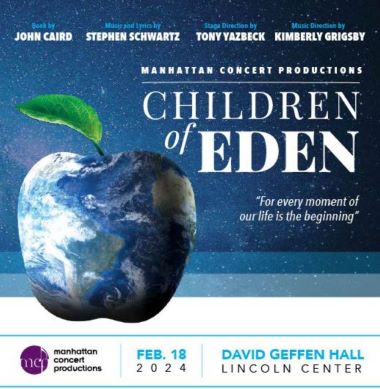AN EDENIC PRODUCTION AT LINCOLN CENTER
Full disclosure, I’d never heard of Stephen Schwartz’s 1991 musical Children of Eden before seeing this one-night only, concert performance at Lincoln Center‘s David Geffen Hall. As a lifelong devotee of American musical theater (aka Musical Theater Queen), that’s surprising. Though if I had to choose any production as first exposure to this very popular show (Music Theatre International ranks it in the top twenty of its most frequently licensed titles), this would be the one. With music and lyrics by Schwartz and book by John Caird, this latest entry from Manhattan Concert Production’s Broadway Series offers a majestic staging featuring a magnificent orchestra, top vocal talents from the worlds of Broadway and Opera, amazing dancers, and an enchanting three-hundred-and-fifty-member chorus, many still children themselves, from across the United States.
There is a tangible sense of the celestial in this re-working of the Old Testament tales of Adam and Eve, Cain and Abel, and Noah and the flood. Essentially chronicling what happens when Man loses his connection to God (a bit Shakespearean in that effect or maybe it’s the other way around), this cautionary tale offers an origin story for the cause of Man’s Original Sin and his journey back to Grace. Under Tony Yazbeck’s expert direction/choreography in conjunction with Kimberly Grigsby’s show-stealing conducting (watching Ms. Grigsby’s joy-filled orchestra work is an entertainment unto itself), the gorgeously refurbished David Geffen Hall proves a perfect setting for this jewel of an excursion into faith, music, retribution and redemption.
Added to that impressive pedigree is the vocal prowess and commanding stage presence of performers Norm Lewis as Father (i.e., God), Nicki Renée Daniels as Eve/Mama Noah, David Phelps as Adam/Noah, Donald Webber Jr. as Cain/Japheth, Lucas Pastrana as Abel/Ham, Auli’I Cravalho as Yonah and a super-talented supporting cast, many of whom doubled as dancers or singing storytellers. Anchored in the biblical Garden of Eden, these top-tier elements produced a heart-filled, sterling production that might re-inspire even the most lapsed Christians among us. However, a funny thing happened on the way to the Garden…
Caird’s book takes the hellfire and brimstone attitude of old-school Bible interpretations and doubles down, particularly in relation to women and people of color. Father (i.e., God) in this telling is narcissistic, demanding, controlling manipulative, distant and surprisingly dismissive of His children (i.e., humanity). In an inexplicable story change, only Eve eats the forbidden fruit, not Adam and Eve, so only Eve is initially banished from the Garden. Banished because this curious young woman simply wants more knowledge about herself and the world around her – apparently a big ’˜no-no’ from her Father’s perspective. And in an attempt to soothe an understandably upset Adam, Father off-handedly tells him, “Don’t worry, I’ll get you another wife”. This leaves Adam with the impossible choice of staying in the Garden/God’s Grace or leaving with the woman he loves (and literally the only woman he’s ever seen). The beautiful song “A World Without You” chronicles his agonizing dilemma and Phelps’s rendition is both lovely and heartbreaking. But once Adam chooses Eve, God immediately banishes them both, the implication being that Man bears no responsibility for the Fall from Grace; it’s all Woman’s fault. And, if given the chance, Woman will lead Man into sin with her. And her sin was…what? Not staying in her place?
Caird’s interpretation of scripture also leans heavily into the “Mark of Cain” or “Race of Cain” trope – a trope that was used by some religious groups, including the Protestant church in America, to help justify slavery. It was believed that the punishment for Cain’s murder of his brother Abel is that Cain’s descendants would all bear this mark, i.e., darker complexions. This explained why some people’s skin is dark and, by association, are fundamentally flawed. The creative team’s choice to cast only actors of color for the main characters in Cain’s line, including his mother Eve, further drove home this point. Not a big deal if the God-fearing, God-chosen, God-obedient characters weren’t solely portrayed by Caucasian actors. Even Yazbeck’s effective staging of Cain’s horrific murder of Abel is repeated in the Noah storyline, when Japheth almost kills one of his brothers, expertly played by the same two white and black actors. One could think that maybe this is just an unintentional production oversight in not realizing the resonance this creative choice could have. That is until an Internet search of other productions finds this same casting template. When Cain and Abel first appear as infants and Abel is clearly white and Cain is clearly black (don’t mixed race babies generally look, well, mixed race?), you know you’re in trouble.
Retro biblical interpretation aside, I’m glad I finally encountered this early effort by Stephen Schwartz. While it probably doesn’t need all twenty-six songs, it speaks to an understanding of the fundamental source of human suffering still believed by many today. Here’s hoping that future productions will find a way to alleviate some of the inherent blame game and stage a production that considers all human beings equally. And that really would be Eden.
no photos at time of publication
Children of Eden in Concert
Manhattan Concert Productions
David Geffen Hall, Lincoln Center, Columbus Avenue at 65th Street
played February 18, 2024 at 8
for more info, visit MCP

